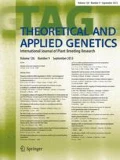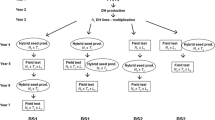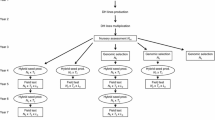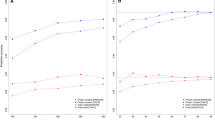Abstract
Key message
The implementation of genomic selection in breeding programs can be recommended for hybrid and line breeding in wheat.
Abstract
High prediction accuracies from genomic selection (GS) were reported for grain yield in wheat asking for the elaboration of efficient breeding strategies applying GS. Our objectives were therefore, (1) to optimize the number of lines, locations and testers in different multi-stage breeding strategies with and without GS, (2) to elaborate the most efficient breeding strategy based on the selection gain and its standard deviation, and (3) to investigate the potential of GS to improve the relative efficiency of hybrid versus line breeding in wheat. We used the open source software package “selectiongain” to optimize the allocation of resources in different breeding strategies by predicting the expected selection gain for a fixed budget. Classical two-stage phenotypic selection was compared with three GS breeding strategies for line and hybrid breeding in wheat. The ranking of the alternative breeding strategies varied largely in dependence of the GS prediction accuracy. Fast-track breeding strategies based solely on GS were only advantageous for high GS prediction accuracies that is >0.50 and >0.65 for hybrid and line breeding, respectively. However, a GS prediction accuracy across breeding cycles of 0.3 or even less must be assumed as realistic for grain yield in wheat. For this low GS prediction accuracy, the use of GS is advantageous for line but especially for hybrid breeding in wheat. Furthermore, the use of GS in hybrid wheat breeding increased the relative efficiency of hybrid versus line breeding and, thus, might be an important pillar for the establishment of hybrid wheat.


Similar content being viewed by others
References
Bernardo R, Yu J (2007) Prospects for genomewide selection for quantitative traits in maize. Crop Sci 47:1082–1090
Burrows PM (1975) Variances of selection differentials in normal samples. Biometrics 31:125–133
Cochran WG (1951) Improvement by means of selection. In: Proceedings of 2nd Berkeley Symp Math Stat Prob, pp 449–470
Dickerson GE, Hazel LN (1944) Effectiveness of selection on progeny performance as a supplement to earlier culling in livestock. J Agric Res 69:459–476
Duvick DN, Smith JSC, Cooper M (2004) Long-term selection in a commercial hybrid maize breeding program. In: Janick J (ed) Plant breeding reviews, part 2 Long term selection: crops, animals, and bacteria, vol 24. Wiley, New York, pp 109–151
Endelman JB, Atlin GN, Beyene Y, Semagn K, Zhang X, Sorrells ME, Jannink J-L (2015) Optimal design of preliminary yield trials with genome-wide markers. Crop Sci 55:48–59
Gordillo GA, Geiger HH (2008) Alternative recurrent selection strategies using doubled haploid lines in hybrid maize breeding. Crop Sci 48:911–922
Heffner EL, Lorenz AJ, Jannink J-L, Sorrells ME (2010) Plant breeding with genomic selection: gain per unit time and cost. Crop Sci 50:1681–1690
Heslot N, Yang H-P, Sorrels ME, Jannink J-L (2012) Genomic selection in plant breeding: a comparison of models. Crop Sci 52:146–160
Heslot N, Jannink J-L, Sorrels ME (2015) Perspectives for genomic selection applications and research in plants. Crop Sci 55:1–12
Hofheinz N, Borchardt D, Weissleder K, Frisch M (2012) Genome-based prediction of test cross performance in two subsequent breeding cycles. Theor Appl Genet 125:1639–1645
Longin CFH (2007) Optimum allocation of test resources and comparison of alternative breeding schemes for hybrid maize breeding with doubled haploids. Dissertation University of Hohenheim, pp 72–74
Longin CFH, Utz HF, Reif JC, Schipprack W, Melchinger AE (2006) Hybrid maize breeding with doubled haploids. I. One-stage versus two-stage selection for testcross performance. Theor Appl Genet 112:903–912
Longin CFH, Gowda M, Mühleisen J, Ebmeyer E, Kazman E, Schachschneider R, Schacht J, Zhao Y, Reif JC (2013) Hybrid breeding in wheat: heterosis, relevance of general and specific combining ability effects and consequences for optimum breeding strategies. Theor Appl Genet 126:2791–2801
Longin CFH, Reif JCR, Würschum T (2014a) Long-term perspective of hybrid versus line breeding in wheat based on quantitative genetic theory. Theor Appl Genet 127:1635–1641
Longin CFH, Mi X, Melchinger AE, Reif JC, Würschum T (2014b) Optimum allocation of test resources and comparison of breeding strategies for hybrid wheat. Theor Appl Genet 127:2117–2126
Lorenz AJ (2013) Resource allocation for maximizing prediction accuracy and genetic gain of genomic selection in plant breeding: a simulation experiment. G3-Genes Genome Genetics 3:481–491
Melchinger AE, Longin CFH, Utz HF, Reif JCR (2005) Hybrid maize breeding with doubled haploid lines: quantitative genetic and selection theory for optimum allocation of resources. In: Proceedings of the 41st annual Illinois Corn Breeders School 2005, Urbana-Champaign, pp 8–21
Mi X, Utz HF, Technow F, Melchinger AE (2014) Optimizing resource allocation for multi-stage selection in plant breeding with R package selection gain. Crop Sci 54:1413–1418
Mühleisen J, Piepho HP, Maurer HP, Longin CFH, Reif JC (2014) Yield stability of hybrids versus lines in wheat, barley and triticale. Theor Appl Genet 127:309–316
R Development Core Team (2012) R: a language and environment for statistical computing. Vienna: R Foundation for Statistical Computing. http://www.r-project.org. Accessed Dec 2014
Riedelsheimer C, Melchinger AE (2013) Optimizing the allocation of resources for genomic selection in one breeding cycle. Theor Appl Genet 126:2835–2848
Storlie E, Charmet G (2013) Genomic selection accuracy using historical data generated in a wheat breeding program. Plant Genome 6:1–9
Utz HF (1984) Calculating and maximizing the gain from selection. Vortr Pflanzenzüchtg 7:30–40
Zhao Y, Zeng J, Fernando R, Reif JC (2013) Genomic prediction of hybrid wheat performance. Crop Sci 53:802–810
Zhao Y, Mette MF, Reif JC (2014) Genomic selection in hybrid breeding. Plant Breed. doi:10.111/pbr.12231
Acknowledgments
We acknowledge the financial support by BMEL within the ZUCHTWERT project (Grant ID: 2814604113). Thanks to two anonymous reviewer, whose suggestions largely improved the manuscript.
Conflict of interest
The authors declare that they have no conflict of interest.
Ethical standard
The authors declare that the experiments comply with the current laws of Germany.
Author information
Authors and Affiliations
Corresponding author
Additional information
Communicated by J. Wang.
Rights and permissions
About this article
Cite this article
Longin, C.F.H., Mi, X. & Würschum, T. Genomic selection in wheat: optimum allocation of test resources and comparison of breeding strategies for line and hybrid breeding. Theor Appl Genet 128, 1297–1306 (2015). https://doi.org/10.1007/s00122-015-2505-1
Received:
Accepted:
Published:
Issue Date:
DOI: https://doi.org/10.1007/s00122-015-2505-1




